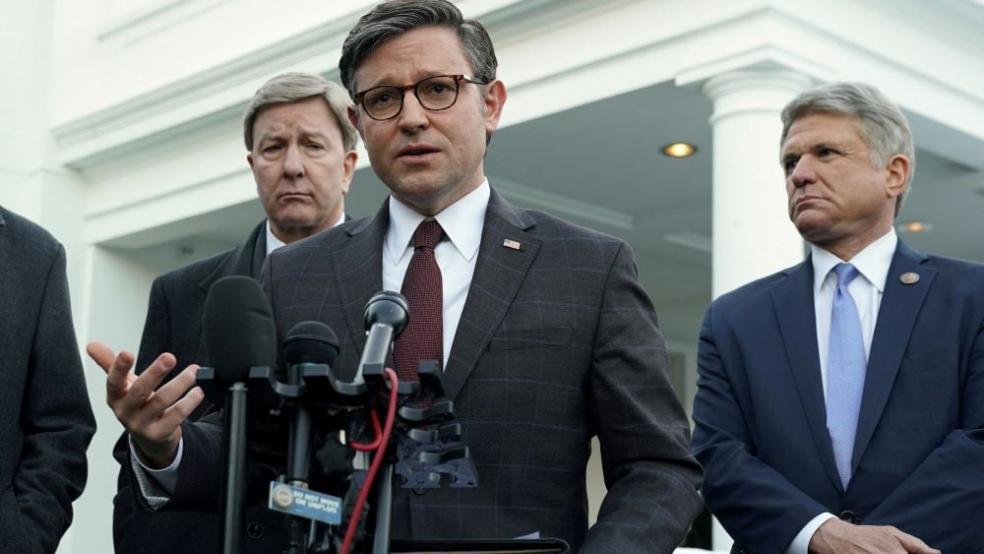President Joe Biden met with congressional leaders at the White House on Wednesday afternoon to press for a $110 billion national security supplemental spending package including additional support for Ukraine and Israel. Yet while both House and Senate leaders emerged from the meeting calling it “productive” or “very positive,” it’s clear that differences over border reforms remain an obstacle to any deal.
“I told the president what I have been saying for many months and that is that we must have change at the border, substantive policy change.,” House Speaker Mike Johnson said after the meeting.
The Louisiana Republican also reiterated that he and his members still want answers about the strategy and endgame in Ukraine’s war to fend off Russian invasion — and accountability for the funding the United States provides. “We understand that all these things are important, but we must insist — we must insist — that the border be the top priority,” Johnson told reporters.
Senate Majority Leader Chuck Schumer said that Biden was open to border changes and that the leaders had largely agreed that they must provide more aid for Ukraine and address the southern border.
“There was a large amount of agreement around the table that we must do Ukraine, and we must do border. There was tremendous focus on Ukraine, and an understanding that if we don't come to Ukraine's aid, that the consequences for America around the globe would be nothing short of devastating,” Schumer said. “There were a couple of people in the room that said let's do border first. We said we have to do both together.”
Schumer said he is more optimistic now that the Senate can reach a border deal unlocking support for more aid to Ukraine, Israel and allies in the Indo-Pacific region. “I am more optimistic than ever before that we come to an agreement. I put the chances a little bit greater than half. And that's the first time I can say that,” he told reporters.
The House isn’t likely to go along, though. Republicans had pushed for border security measures as a precursor to any additional Ukraine aid, but Johnson has insisted that the bipartisan border bill being negotiated in the Senate would fall short of House GOP demands and be dead on arrival in his chamber.
“I don’t think now is the time for comprehensive immigration reform because we know how complicated that is,” he said hours before the White House meeting. “You can’t do that quickly. I do think it’s past time to secure the border.”
Johnson reiterated that the border must be secured before more aid could go to Ukraine. “I’m going to tell the president what I’m telling all of you, what we’ve told the American people: border, border, border,” he said. “We have to secure our own border before we talk about doing anything else.”
He also suggested that even a deal that met his criteria might still not be enough to win Republican support for Ukraine.
Republican rifts remain: House and Senate Republican leaders are divided on the supplemental bill and aid to Ukraine. Senate Minority Leader Mitch McConnell has urged his members to take the deal being negotiated for Republicans by Sen. James Lankford of Oklahoma. “I think it’s time to go ahead with the supplemental, and I’m anticipating that it’ll be before us next week,” McConnell told reporters.
McConnell and other senior Senate Republicans are urging their members to make the most of the leverage they have at this moment and not wait for the possibility of a Republican-controlled Congress and White House next year. “If we had a 100 percent Republican government — president, House, Senate — we probably would not be able to get a single Democratic vote to pass what Senator Lankford and the administration are trying to get together on,” McConnell said. “So this is a unique opportunity to accomplish something in divided government that wouldn’t be there under unified government.”
Staving off a shutdown: The Senate on Tuesday night cleared one hurdle on the path to a stopgap spending bill needed to avoid a partial government shutdown Friday. Johnson on Wednesday again defended his agreement with Schumer for $1.66 trillion in discretionary spending for fiscal year 2024, which has come under fire from ultraconservatives in his conference.
He also defended his acceptance of a short-term spending measure, known as a continuing resolution or CR, after having said he doesn’t want any more such bills. “I wanted no more CRs until we could move this process forward. We’ve achieved that,” Johnson told reporters. “In spite of what people are saying on both sides, this is a better agreement than we had.”
Johnson noted that Republicans have the second-smallest House majority in U.S. history and so can’t expect to get everything they want. But, he argued, the current process will result in the Republican goal of passing individual spending bills rather than an omnibus and will allow how appropriators to fight for GOP policy changes in those spending bills.
What’s next: History suggests that McConnell is right about the prospects of a border deal under a Trump administration and Republican-led Congress. But finalizing a deal won’t be easy. Senate negotiators reportedly still have to bridge some key differences, and Johnson still faces the fury of his right-wing members, who remain angry over his spending deal and would erupt over a border deal that failed to meet all of their demands.
The bottom line: Republicans may want to ensure that the border stays a hot-button issue in an election year. Then again, decrying the border crisis but refusing to act on it might be a politically perilous stance.





